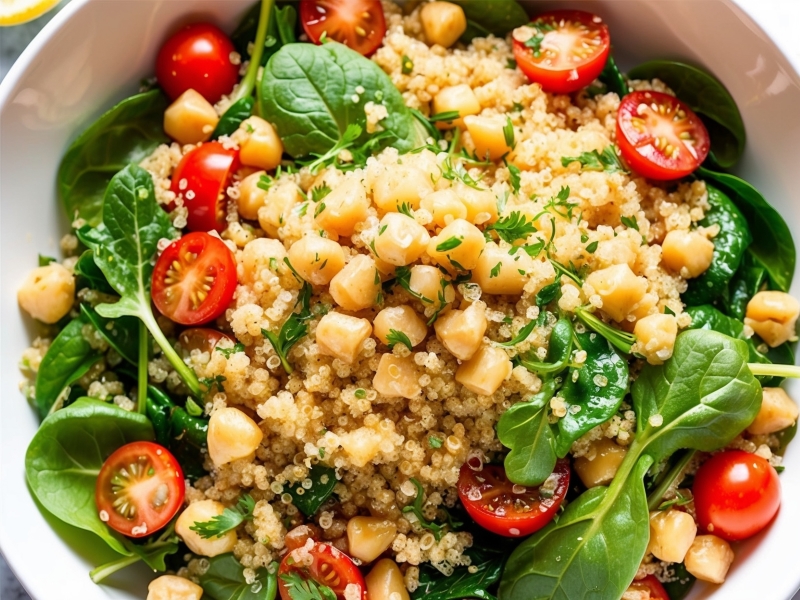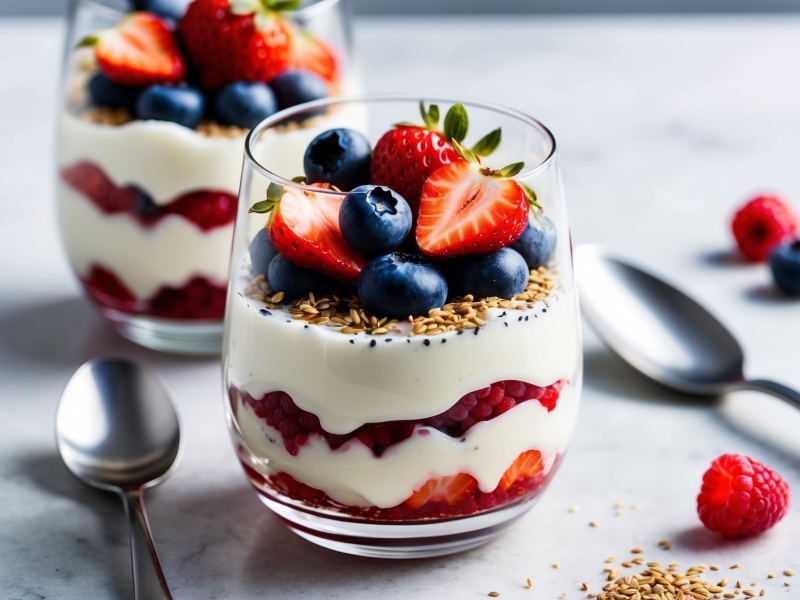Table of Contents
What is the 90-30-50 Meal Plan?
90-30-50 meal plan is a balanced eating strategy that manages daily carbohydrates, proteins, and fats in specific ratios to promote energy and well-being. This straightforward approach simplifies nutritious eating, supports weight loss, and enhances overall health, making it a sustainable choice for achieving your nutrition goals.
Why Consider the 90-30-50 Meal Plan?
The 90-30-50 meal plan emphasizes balance rather than restriction, making it a sustainable and effective way to nourish your body. By distributing your daily intake of carbohydrates, proteins, and healthy fats in a specific ratio, you can optimize your energy levels, support bodily functions, and promote overall well-being.
Balanced Nutrient Distribution
Unlike diets that severely limit certain food groups, the 90-30-50 meal plan allows for a well-rounded intake of nutrients. This balance ensures that your body gets the fuel it needs without overloading on any single macronutrient.
Breakdown of the 90-30-50 Meal Plan
Understanding the specific allocations of each macronutrient can help you implement this meal plan effectively:
1. 90 Grams of Carbohydrates
Carbohydrates are the primary source of energy for your body. Allocating 90 grams of carbs daily ensures you have sufficient fuel for daily activities, brain function, and physical exercise.
- Benefits of Carbs:
- Energy Production: Carbs are essential for powering your muscles and brain.
- Nutrient-Rich Sources: Opt for complex carbs like whole grains, fruits, and vegetables, which provide fiber, vitamins, and minerals.
- Sustained Energy: Complex carbohydrates help maintain stable blood sugar levels, preventing energy crashes.
2. 30 Grams of Protein
Protein is crucial for various bodily functions, including muscle repair, immune support, and maintaining overall body structure.
- Benefits of Protein:
- Muscle Maintenance: Helps in building and repairing muscles, especially important if you’re active or exercising regularly.
- Immune Support: Strengthens the immune system, helping your body fight off illnesses.
- Satiety: Protein-rich foods keep you feeling full longer, aiding in weight management.
3. 50 Grams of Healthy Fats
Healthy fats are vital for nutrient absorption, brain health, and hormone production.
- Benefits of Healthy Fats:
- Nutrient Absorption: Fats help your body absorb fat-soluble vitamins (A, D, E, K).
- Brain Health: Essential for cognitive functions, as the brain is approximately 60% fat.
- Heart Health: Supports cardiovascular health by maintaining healthy cholesterol levels.
Fun Fact: Your brain is about 60% fat, making healthy fats an essential part of any diet.
Benefits of the 90-30-50 Meal Plan
Adopting the 90-30-50 meal plan offers numerous advantages that contribute to a healthier and more balanced lifestyle:
1. Enhanced Energy Levels
With a balanced intake of carbohydrates, proteins, and fats, your body receives a steady supply of energy. This prevents the peaks and crashes associated with high-sugar or high-carb diets, keeping you energized throughout the day.
2. Improved Nutrient Absorption
Healthy fats aid in the absorption of essential vitamins and minerals, ensuring your body gets the most out of the foods you consume.
3. Weight Management
By focusing on balanced macronutrient ratios, the 90-30-50 meal plan helps control hunger and prevent overeating. Protein and healthy fats contribute to satiety, making it easier to maintain or achieve your desired weight.
4. Better Digestion and Gut Health
A balanced diet rich in fiber from complex carbohydrates supports healthy digestion and a thriving gut microbiome, which is crucial for overall health.
5. Sustainable and Flexible
Unlike restrictive diets, the 90-30-50 meal plan is flexible and can be tailored to fit individual preferences and lifestyles, making it easier to stick with long-term.

How to Create Meals That Fit the 90-30-50 Plan
To make this meal plan work for you, focus on building meals with the right portions of carbs, protein, and fats. Here’s how to get started:
1. Understand Your Carbohydrate Sources
Choose complex carbs that digest slowly, providing a steady source of energy. Some examples include:
- Whole grains: Brown rice, quinoa, oats
- Legumes: Lentils, chickpeas, beans
- Vegetables: Sweet potatoes, carrots, and squash
Tip: Avoid refined carbs like white bread and sugary snacks, which can lead to quick energy crashes.
2. Select Quality Proteins
Aim for lean protein sources that are nutrient-dense and support muscle health:
- Chicken breast or turkey
- Fish and seafood: Salmon, tuna, shrimp
- Plant-based proteins: Tofu, tempeh, edamame
3. Incorporate Healthy Fats
Include fats that support overall well-being, such as:
- Avocado and olive oil
- Nuts and seeds: Almonds, chia seeds, flaxseeds
- Fatty fish: Rich in omega-3s for brain and heart health
Sample 90-30-50 Meal Plan for One Day
Creating meals within the 90-30-50 framework can be fun and flexible. Here’s a sample day to illustrate:
Breakfast: Greek yogurt parfait
- 1 cup of Greek yogurt (protein)
- 1/2 cup of mixed berries (carbs)
- 1 tbsp of flaxseeds (healthy fats)
Lunch: Quinoa and chickpea salad
- 1/2 cup cooked quinoa (carbs)
- 1/2 cup chickpeas (protein)
- Drizzle of olive oil and diced avocado (fats)
Dinner: Grilled salmon with sweet potato and spinach
- 1 salmon fillet (protein and fats)
- 1 medium sweet potato (carbs)
- Steamed spinach on the side
Snack: Almonds and a banana
- A small handful of almonds (fats and protein)
- 1 banana (carbs)
The Importance of Nutrient Balance for Overall Well-Being
Achieving Nutrient Balance is crucial for your overall well-being and plays a significant role in maintaining optimal health. Balanced eating goes beyond just managing your weight—it ensures your body receives the essential nutrients it needs to function efficiently and support long-term wellness. Here’s why nutrient balance is so important and how the 90-30-50 Meal Plan can help you achieve it.
Why Nutrient Balance Matters
Balanced eating is fundamental for several reasons:
Enhanced Mental Health: Proper nutrition is linked to better brain function, mood stability, and cognitive performance.
Optimal Body Function: Your body relies on a variety of nutrients to perform everyday tasks, from cellular repair to energy production.
Long-Term Wellness: Consistently consuming a balanced diet helps prevent chronic diseases and supports overall longevity.
The 90-30-50 meal plan is designed to promote nutrient balance by distributing your daily intake of carbohydrates, proteins, and healthy fats in an optimal ratio. Here’s how this meal plan supports your health:
1. Heart Health
Maintaining a balanced intake of healthy fats and proteins helps reduce bad cholesterol levels and lowers the risk of heart disease. Omega-3 fatty acids, found in foods like salmon and walnuts, are particularly beneficial for heart health.
2. Stable Blood Sugar Levels
Consuming the right amount of carbohydrates helps regulate your blood sugar levels, preventing spikes and crashes that can lead to energy fatigue and cravings. Whole grains, vegetables, and fruits are excellent sources of complex carbohydrates that provide sustained energy.
3. Enhanced Brain Function
Healthy fats are essential for brain health. Your brain is about 60% fat, making the inclusion of sources like avocados, nuts, and olive oil vital for cognitive functions and emotional well-being.
Incorporating Whole, Unprocessed Foods
Research consistently shows that diets rich in whole, unprocessed foods offer lasting health benefits:
- Nutrient Density: Whole foods are packed with vitamins, minerals, and antioxidants that support various bodily functions.
- Reduced Risk of Chronic Diseases: Diets high in processed foods are linked to obesity, diabetes, and heart disease, whereas whole foods help mitigate these risks.
- Improved Digestion: Fiber-rich whole foods promote a healthy gut microbiome, enhancing digestion and nutrient absorption.
Resources for Balanced Nutrition
For more detailed information on balanced eating and nutrient-rich meals, visit the Harvard T.H. Chan School of Public Health’s guide on healthy eating. This comprehensive resource provides insights into why nutrient-rich meals matter and offers practical advice on creating a healthier lifestyle.
Frequently Asked Questions About the 90-30-50 Meal Plan
1. Can the 90-30-50 meal plan be adjusted for different goals?
Yes! This plan is flexible and can be adapted based on your caloric needs. If your goal is weight loss, you may want to reduce portion sizes. If you’re training intensely, consider increasing the protein and carb amounts proportionally.
2. Is the 90-30-50 plan suitable for vegetarians or vegans?
Absolutely. You can swap animal proteins for plant-based options like tofu, tempeh, beans, and lentils. Healthy fats can come from sources like coconut oil, avocado, and nut butters.
3. Do I need to follow this plan perfectly every day?
Perfection isn’t necessary! The idea is to create a sustainable habit. Aim to balance your meals most of the time and be kind to yourself if some days don’t align perfectly.
Check out our guide on maintaining a healthy diet for busy weeks.
Tips for Making the 90-30-50 Plan Work for You
- Plan ahead: Take time at the start of each week to plan meals. This makes grocery shopping easier and reduces the temptation to grab quick, unhealthy options.
- Track portions: Measuring your food can help you understand how much you’re eating and adjust as needed. However, try not to become too rigid — it’s okay to listen to your body’s hunger cues.
- Stay hydrated: Water plays a critical role in digestion and overall energy. Aim for 8 glasses a day to stay hydrated and help your body use nutrients effectively.
- Stay flexible: Life happens, and not every day will look the same. Give yourself grace and know that balanced eating is about consistency, not perfection.
Final Thoughts: Embrace Balance and Enjoyment
The 90-30-50 meal plan is a tool to help you achieve a balanced, nutrient-rich diet that supports your lifestyle. By focusing on wholesome foods, portion control, and variety, you create a pathway to sustainable health. Remember, nutrition should feel good, not restrictive. Celebrate the process, explore new recipes, and make eating a joyful part of your day.

